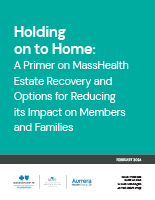

Holding on to Home: A Primer on MassHealth Estate Recovery
Federal law requires states to recoup costs from certain Medicaid members’ estates – the money and possessions left after someone dies – if they received long-term services and supports (LTSS), such as care in a nursing facility or at home. But some states, including Massachusetts, exceed the federal minimum and recover the cost of all Medicaid-covered services that are provided to members over age 55. This means far more members are affected because it is not just limited to those who use LTSS. By limiting the passing down of assets – including homes – the practice of estate recovery may perpetuate wealth disparities and intergenerational poverty. While MassHealth has made reforms in recent years to reduce the burden of estate recovery on impacted members and families, more can be done.
These materials are intended to educate stakeholders, policymakers, and others about MassHealth’s estate recovery program. They include:
- An issue brief that describes Massachusetts’ estate recovery policy and practices and what is known about its impact on members and their families. The brief also identifies policy and programmatic options that the state could pursue to reduce the burden of estate recovery.
- A series of qualitative profiles that tell the stories of how estate recovery has impacted four individuals in Massachusetts after the loss of a loved one.
